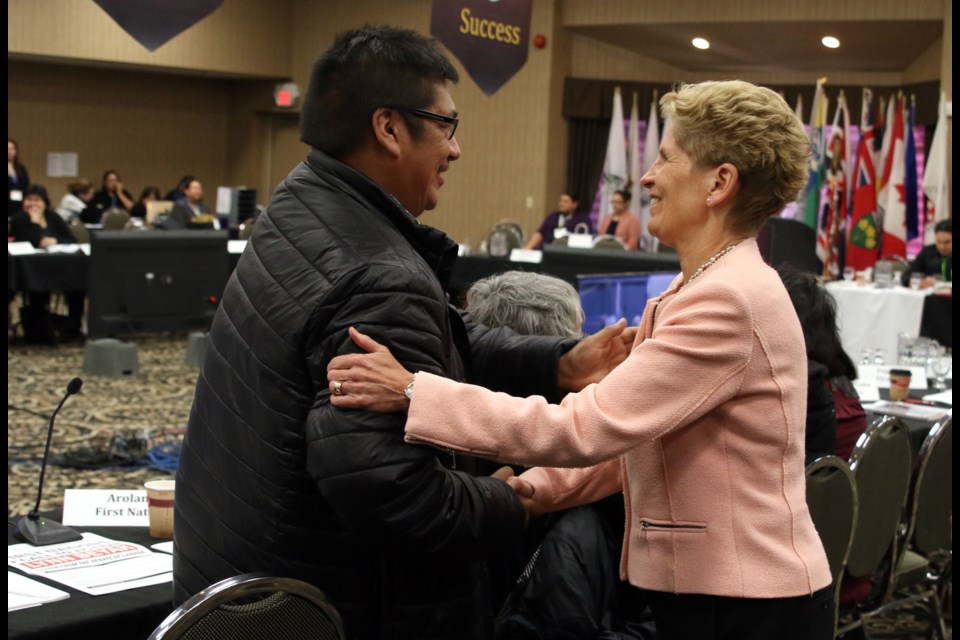THUNDER BAY - First Nation leaders demanded to know what Ontario Premier Kathleen Wynne and her government are doing to give more control to First Nations when it comes to making decisions about resources and child welfare.
The second day of the Nishnawbe Aski Nation Chiefs Winter Assembly was held on Wednesday and Premier Kathleen Wynne addressed and took questions from the 31 NAN territory members.
Wynne addressed issues ranging from the Far North Act, Indigenous youth, and First Nations communities having a place at the table when it comes to decisions being made that impact their territory and resources.
“We don’t just want to be passengers on a vehicle,” Neskantaga First Nation chief, Wayne Moonias told Wynne. “We want to be drivers. We want to be able to steer what is going to happen in our lands.”
The last time Wynne was in Thunder Bay in August 2017, she announced a deal had been reached between Ontario and Webequie, Nibinamik, and Marten Falls First Nations to construct a road to the Ring of Fire, but Neskantaga, which was not included in the deal, said it was premature.
“There are decisions that are being made right now that affect my community,” Moonias continued. “When is the government going to take serious action to respect and recognize my First Nation, our First Nation? That is the big question that has to be answered by the government today and tomorrow if we are truly going to have reconciliation.”
Wynne said the province and First Nations have a complex relationship and that the government is continuing to work to bring opportunities to the people living in remote communities.
“We are working at every turn, whether it is in terms of getting infrastructure built so there is a possibility of economic development in the north, or whether it is finding a way to completely overhaul the child welfare system so that kids get their needs met and able to be looked after in their communities, or whether it’s finally having the federal government at the table so we can deal with issues like housing, and clean water and do that together,” Wynne said.
Other NAN leaders questioned Wynne about the Far North Act, with one chief asking if the legislation would be amended or repealed.
“If you are serious about honouring our jurisdiction, you will significantly amend or repeal the Far North Act,” said Chief Dinah Kanate of North Caribou Lake. “It’s not working.”
Kanate referenced all-season roads that her community built that were funded by Indigenous and Northern Affairs Canada. She said if the roads are funded up to Ministry of Transportation standards, the roads become public.
“Our community loses jurisdiction and control,” Kanate continued. “Access becomes an issue. The public can use this road like any other highway. I don’t want to sign up to anything that takes away my communities jurisdiction, but it seems like we don’t have any anyway. Ontario has the ultimate upper hand, a veto power over anything the province wants at any time on our land, they will take. That’s the Far North Act.”
Wynne said her government is willing to put the resources in to sorting these issues out and having a discussion about jurisdictional concerns, while also maintaining a workable funding model in place for infrastructure projects.
“I know there have been real challenges with the Far North Act,” Wynne continued. “I also know that whenever I gather with a group of you, we have to talk about the jurisdictional issues in many ways. This is an example of that. On one hand, it’s a good thing there funding put in place, it’ a good thing the standards be high enough that it’s a safe road, and we have to sort out the jurisdictional issue.”
Other questions referred to the child welfare system and abuse inflicted upon Indigenous youth in the past and present, and how the province is not providing solutions.
“We’ve seen our children come home that are under your care in a casket,” said grand chief, Jonathan Solomon of the Mushkegowuk Council. “We’ve seen children come home losing their identity and their language. I want to ask you premier, what is your plan? Because we never gave up our jurisdiction over our children.”
Wynne said any abuses identified are inexcusable, adding that she is pleased to see the federal government finally at the table, who she said has been absent for many years and making it difficult to have a conversation about resources to provide more local control of child welfare to First Nations.
“Some of the solutions we have worked on with communities, with the principle of local control being at the heart of what we are trying to do,” she said. “I agree with you that we need to make sure First Nation, Indigenous kids have the care of their community and their families are able to look after them.”
NAN deputy Grand Chief, Anna Betty Achneepineskum, said it was very promising to see the premier address the assembly, but more work still needs to be done.
“There is a lot of things we need to do to ensure the questions and the comments that were asked, and the historic issues that continue to exist, that those things need to be addressed,” she said.
